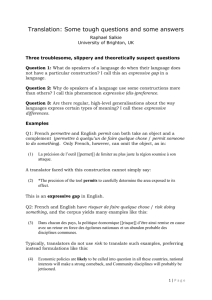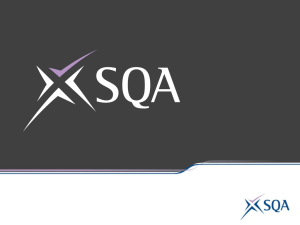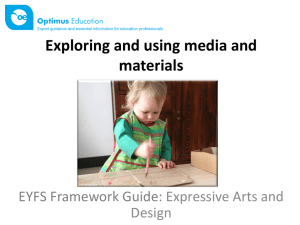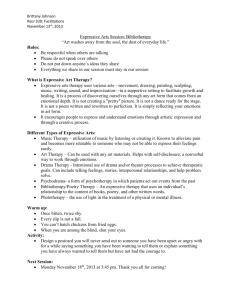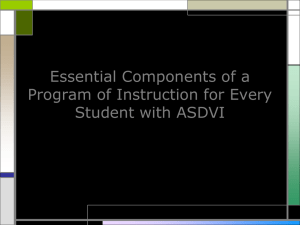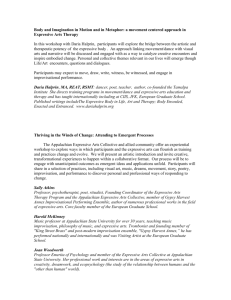HPC 6370 Syllabus - Syllabi
advertisement
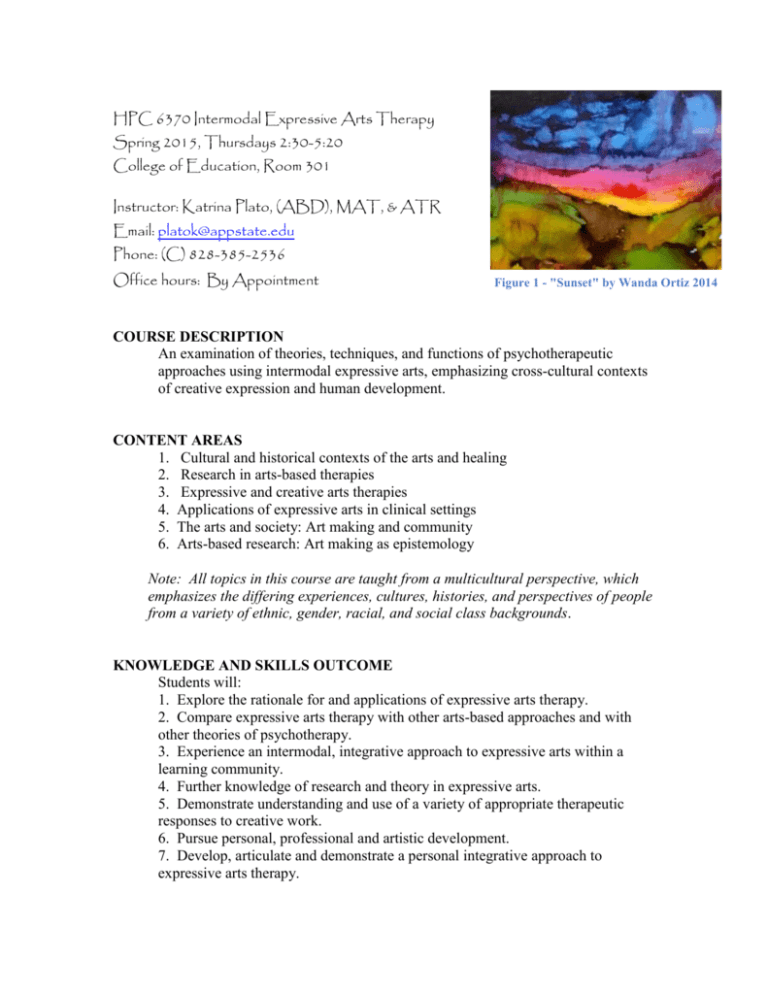
HPC 6370 Intermodal Expressive Arts Therapy Spring 2015, Thursdays 2:30-5:20 College of Education, Room 301 Instructor: Katrina Plato, (ABD), MAT, & ATR Email: platok@appstate.edu Phone: (C) 828-385-2536 Office hours: By Appointment Figure 1 - "Sunset" by Wanda Ortiz 2014 COURSE DESCRIPTION An examination of theories, techniques, and functions of psychotherapeutic approaches using intermodal expressive arts, emphasizing cross-cultural contexts of creative expression and human development. CONTENT AREAS 1. Cultural and historical contexts of the arts and healing 2. Research in arts-based therapies 3. Expressive and creative arts therapies 4. Applications of expressive arts in clinical settings 5. The arts and society: Art making and community 6. Arts-based research: Art making as epistemology Note: All topics in this course are taught from a multicultural perspective, which emphasizes the differing experiences, cultures, histories, and perspectives of people from a variety of ethnic, gender, racial, and social class backgrounds. KNOWLEDGE AND SKILLS OUTCOME Students will: 1. Explore the rationale for and applications of expressive arts therapy. 2. Compare expressive arts therapy with other arts-based approaches and with other theories of psychotherapy. 3. Experience an intermodal, integrative approach to expressive arts within a learning community. 4. Further knowledge of research and theory in expressive arts. 5. Demonstrate understanding and use of a variety of appropriate therapeutic responses to creative work. 6. Pursue personal, professional and artistic development. 7. Develop, articulate and demonstrate a personal integrative approach to expressive arts therapy. CLASS FORMAT/ METHOD OF TEACHING This class will have a balance of content and experiential components, including lecture, discussion, presentations, small group work, and art making activities. Imaginative thinking and creativity are encouraged. Personal reflection and sharing are important components of the course. COURSE REQUIREMENTS Attendance and participation: Since the course utilizes a seminar format and has an experiential component, class attendance and meaningful participation are mandatory. This includes the practice of opening and closing the class. Reading: Assigned readings, research, and book reports are posted on the class calendar. Students are to be prepared for classes by being up-to-date with assigned readings. Intermodal Self-Portrait: Include a musical piece, a poem, and visual image of yourself as an emerging expressive arts therapist. Due January 22nd Empirical Study Report and Presentation: Prepare and present in class an oral review of one empirical study linked to expressive arts therapy. Share copies of the study with class and on AsULearn by February 26th Empirical research on the arts and counseling, psychotherapy and health can be found in a variety of professional journals, including journals in nursing and allied health, the modality based arts therapies, counseling, psychology and psychotherapy. Suggested Journals: The Arts in Psychotherapy Journal of Applied Arts and Health Journal of Creativity in Mental Health Poiesis: A Journal of the Arts and Communication Psychology of Aesthetics, Creativity, and the Arts Service Project: Participation in expressive arts service project (to be announced). The class will lead a collaborative experiential expressive arts activity. Planning for the service project will take place in class. Write a one page reflective paper. Book Reports: Read two books of your choice. 1) One book that is a personal favorite which “you can't live without” that links to your theoretical foundation. This may be a non-fiction or fictional book, a book from your youth, or a spiritual book- a book that has made such an impact upon you that you integrate it into your life work as an educator or counselor. 2) One book from the list of original sources enclosed. Submit a written report (2 pages) on each book. In the report, make a connection to how you will, or already do utilize the concepts in the book in your practice. Due the last day of class COURSE REQUIREMENTS continued MID TERM: Define 5-10 terms from the EXA concept that you plan to work with this semester. Example of terms are: holding space, listening, low-skill/high sensitivity, presence... etc. These terms will be used in a mid-term exam. Define the terms in one or two sentences. With the definitions, include APA references with page numbers. Terms are DUE February 26th Theory of Practice Outline and Presentation: Part A: A one-page draft of your outline for your lecture/demonstration of personal work in expressive arts. Hand in a hardcopy on March 5th Include the following: Principles and attitudes that guide your practice Theoretical or philosophical constructs that underlie your work Demonstration of how your work through an EXA activity Part B: A 45-minute lecture/demonstration (scheduled in class) of personal work in expressive arts, which illustrates the three components of your outline. Part C: A five to 15 page paper detailing your outline above including a minimum of 10 APA style references. Submit an electronic copy on AsULearn on the day of your presentation BINDER: DUE the last day of class. Turn in a three ring binder with physical copies of the papers you have completed for class. Include: Intermodal portrait poem EXA activity one-page reflection paper (in place of class on Feb. 12th) Your mid-term definitions with APA references Service project one-page reflective paper Book report(s) Final Theory of Practice Paper FINAL PROJECT: Poetry Books: Prepare a 5”x7” illustrated card for each member of class containing a poem that you believe suits the person. Each class member will sew a small booklet from the poems they receive on the last day of class. DUE the last day of class GRADING: Grading in this course will be done on a contract basis as follows: A-Contract 1. Attend and participate in all classes-no absences or tardies 2. Complete all weekly assignments, including research and book reports 3. Participate in one service project, summarized in a one-page reflection paper due the class following the session. 4. Complete Mid-Term Exam and submit Theory outlines on time. 5. Submit two written book reports. 6. Theory of Practice Presentation and Paper completed at A level of quality. (Rubrics will be provided.) B-Contract 1. Attend and participate in classes with no more than one absence or two tardies. 2. Complete all weekly assignments. 3. Complete Mid-Term Exam and submit Theory outlines on time. 4. Submit one written book report. 5. Paper/Presentation: completed at B level of quality All work is expected to be carefully and thoughtfully prepared. The professor reserves the right to raise or lower the contract grade up to one letter grade based on quality of student work and on class attendance and participation. REQUIRED READINGS: Degges-White, S. & Davis, N. L. (2011). Integrating the expressive arts into counseling practice: Theory-based interventions. New York: Springer. Knill, P.J., Levine, E.G., & Levine, S.K., (2005). Principles and practice of expressive arts therapy. Philadelphia: Jessica Kingsley. One book from the Original Source Readings resource. One book that is a personal favorite which “you can't live without” that links to your theoretical ideas toward an expressive arts counseling practice. This may be a non-fiction or fictional book, maybe even a book from your youth, or a spiritual book; any book that has made such an impact upon you that you integrate it into your life work. REFERENCES: See extensive bibliography in “Review of Concepts” below and in Expressive Arts Therapy: Creative Process in Art and Life (Atkins, et al. 2003). ATTENDANCE REQUIREMENTS Excused absences for illness or religious observance require written notification and additional make up work. “Graduate students are expected to be responsible for regular class attendance. A student whose attendance in classes is unsatisfactory to the instructor, the advisor, or the Dean of Graduate Studies and Research, may be excluded from a course, a final examination, or a graduate program.” A.S.U. Graduate Bulletin, pp. 51-52. Professional Responsibilities. Each class participant will be expected to read all assignments before class and participate in class discussions. Students are expected to complete all assignments on time formatted according to APA standards. All work must be typed and professionally presented for feedback. Cell phones, pagers, and texting devices should not be answered and be turned off or placed on silent during class. Please call and discuss any concerns or circumstances prior to any due dates. Attendance Policy. It is the policy of Appalachian State University that class attendance is an important part of a student's educational experience. Students are expected to attend every meeting of their classes and are responsible for class attendance. Notification can be communicated via telephone, email, or in person. Regardless of what reasons there may be for absence, students are accountable for all academic activities. In addition, faculty members are required to make reasonable accommodations for students requesting to miss class due to the observance of religious holidays. All ASU students are allowed a minimum of two absences per year for religious observances. Up to two absences for such observances will be excused, without penalty to the student, provided that the student has informed the instructor in the manner specified in the syllabus. Notice must be given by the student to the instructor before the absence occurs and no later than three weeks after the start of the semester in which the absence(s) will occur. Arrangements will be made to make up work missed by these religious observances, without penalty to the student. For the purposes of this policy, ASU defines the term “religious observance” to include religious holidays, holy days, or similar observances associated with a student’s faith that require absence from class. Inclement Weather: In the event of inclement weather, use reasonable judgment and do not put yourself at unnecessary risk. In case of hazardous weather, the instructor will notify students by email that class will be postponed or that independent work will be assigned. Campus email addresses will be used for all class correspondence. Student Conduct and Academic Integrity: As a community of learners at Appalachian State University, we must create an atmosphere of honesty, fairness, and responsibility, without which we cannot earn the trust and respect of each other. Furthermore, we recognize that academic dishonesty detracts from the value of an Appalachian degree. Therefore, we shall not tolerate lying, cheating, or stealing in any form and will oppose any instance of academic dishonesty. This course will follow the provisions of the Academic Integrity Code, which can be found on the Office of Student Conduct Web Site: www.studentconduct.appstate.edu. Accommodating Students with Special Learning Needs. Appalachian State University is committed to making reasonable accommodations for individuals with documented qualifying disabilities in accordance with the Americans with Disabilities Act of 1990, and Section 504 of the Rehabilitation Act of 1973. Those seeking accommodations based on a substantially limiting disability must contact and register with The Office of Disability Services (ODS) at http://www.ods.appstate.edu/ or 828-262-3056. Once registration is complete, individuals will meet with ODS staff to discuss eligibility and appropriate accommodations.
